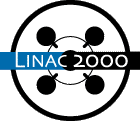
M. LIEPE* (DESY)
The design of the proposed linear collider TESLA is based on 9-cell 1.3 GHz superconducting niobium cavities, operated in pulsed mode. Within the framework of an international collaboration the TESLA Test Facility (TTF) has been set up at DESY, providing the infrastructure for cavity R&D towards higher gradients. More than 50 nine-cell cavities were tested, accelerating gradients as high as 30 MV/m were measured. In the second production of 23 TTF-cavities the average gradient was measured to be 25.0 +- 3.2 MV/m. Two modules, each containing eight resonators, are presently used in the TTF-linac. These cavities are operated in pulsed mode: 0.8 ms constant gradient with up to 10 Hz repetitions rate. We will focus on two aspects: Firstly, the cavity fabrication and treatment is discussed, allowing to reach high gradients. Latest results of single cell cavities will be shown, going beyond 40 MV/m. Secondly, the pulsed mode operation of superconducting cavities is reviewed. This includes Lorentz force detuning, mechanical vibrations (microphonics) and rf field control. Both topics meet the upcoming interest in superconducting proton linacs, like the sc driver linac for SNS (Spallation Neutron Source).
* for the TESLA collaboration
Comments or Questions to
linac2000@slac.stanford.edu